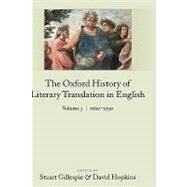The Oxford History of Literary Translation in English Volume 3: 1660-1790
, by Gillespie, Stuart; Hopkins, David- ISBN: 9780199246229 | 019924622X
- Cover: Hardcover
- Copyright: 12/1/2005
This groundbreaking five-volume history runs from the Middle Ages to the year 2000. It is a critical history, treating translations wherever appropriate as literary works in their own right, and reveals the vital part played by translators and translation in shaping the literary culture of the English-speaking world, both for writers and readers. It thus offers new and often challenging perspectives on the history of literature in English. As well as examining the translations and their wider impact, it explores the processes by which they came into being and were disseminated, and provides extensive bibliographical and biographical reference material. In the one hundred and ten years covered by volume four of The Oxford History of Literary Translation in English, what characterized translation was above all the move to encompass what Goethe called "world literature." This occurred, paradoxically, at a time when English literature is often seen as increasingly self-sufficient. In Europe, the culture of Germany was a new source of inspiration, as were the medieval literatures and the popular ballads of many lands, from Spain to Serbia. From the mid-century, the other literatures of the North, both ancient and modern, were extensively translated, and the last third of the century saw the beginning of the Russian vogue. Meanwhile, as the British presence in the East was consolidated, translation helped readers to take possession of "exotic" non-European cultures, from Persian and Arabic to Sanskrit and Chinese. The thirty-five contributors bring an enormous range of expertise to the exploration of these new developments and of the fascinating debates which reopened old questions about the translator's task, as the new literalism, whether scholarly or experimental, vied with established modes of translation. The complex story unfolds in Britain and its empire, but also in the United States, involving not just translators, publishers, and readers, but also institutions such as the universities and the periodical press. Nineteenth-century English literature emerges as more open to the foreign than has been recognized before, with far-reaching effects on its orientation.







